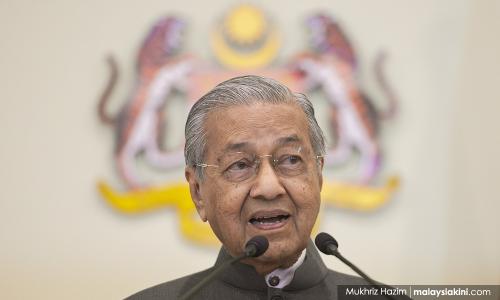Dr M: New sewage treatment technology being tested
Sewage treatment plants in the country are expected to adopt a new form of technology that is far more efficient, cleaner and cheaper if a pilot project to treat wastewater now being implemented in Langkawi proves effective.
Prime Minister Dr Mahathir Mohamad said the Advanced Moving Bed Bio-Reactor (AMBBR) technology now being tested at the sewage treatment plant in Pantai Tengah will undergo trials for two years before being introduced in other plants.
“We have always been faced with a water purity problem, whether in shops or households where ever they may be. We now have a new Malaysian-owned system which processes wastewater and completely clears it of sediments.
“We have discovered this system. We now have treatment plants with large pools and they are very costly. We will test this new system for two years, and if successful, it will replace the system used currently to treat wastewater,” he told reporters after a visit to the plant in Pantai Tengah, Langkawi to survey the implementation of the new technology.
The prime minister said this new treatment technology was extremely important to ensure wastewater is treated in the best possible way, as otherwise, it could end up polluting the beaches and the sea.
Elaborating further, Mahathir, who is Langkawi MP, said this particular technology was the first of its kind in Malaysia, and if it goes on to produce an excellent success rate, then the technology could be sold to other interested nations as well.
The RM16.5 million AMBBR pilot project is being undertaken by Kyoto Water Sdn Bhd, he said.
The project, which was completed in 2018, is now in its defect liability period (DLP) before it is expected to be handed over to Indah Water Konsortium Sdn Bhd in June this year.
Meanwhile, asked on whether there was sufficient water supply in Langkawi, Dr Mahathir said supply currently was now sourced from Perlis on the mainland via a dedicated pipeline.
He said fishing activities that used nets tend to damage the pipeline, causing supply disruptions.
"We found that we have been losing a lot of water at sea via the Perlis-Langkawi pipeline because of the fishing nets that drag and damage the pipes, and to resolve this, we have to plant them beneath the seabed,” he said.
He said Langkawi’s groundwater could also be used as an option for its water supply, in the process cutting dependence on the pipeline supply from the mainland.
Commenting on the move to reduce the toll rate by 18 percent on several highways under Projek Lebuhraya Utara-Selatan (Plus), Mahathir said it would not affect the concessionaire financially, especially when it comes to maintenance of the highways.
“Plus has stated that with the 18 percent (toll rate) reduction, and without any hikes in the next 38 years, it can earn enough to maintain its highways.
“We believe traffic volume in the years to come could increase and this would add to Khazanah’s revenue on top of other sources of income such as through advertisement space and so on,” he said.
Khazanah Nasional Bhd owns a 51 percent stake in Plus while the Employees Provident Fund (EPF) holds the remaining 49 percent.
- Bernama
RM12.50 / month
- Unlimited access to award-winning journalism
- Comment and share your opinions on all our articles
- Gift interesting stories to your friends
- Tax deductable

